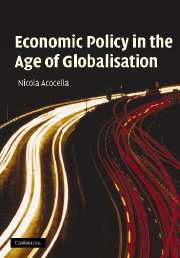Book contents
- Frontmatter
- Contents
- List of boxes
- List of tables
- List of symbols, abbreviations and acronyms
- Preface
- 1 Introduction
- Part I The market, efficiency and equity
- Part II Normative and positive theory of economic policy
- Part III Microeconomic policies
- Part IV Macroeconomic policies
- Part V Public institutions in an international setting
- 16 Monetary systems and exchange rate regimes
- 17 Development and trade organisations
- 18 Regional public institutions: The European Union
- Part VI Globalisation and the quest for a new institutional setting
- Bibliography
- Author index
- Subject index
17 - Development and trade organisations
Published online by Cambridge University Press: 14 May 2010
- Frontmatter
- Contents
- List of boxes
- List of tables
- List of symbols, abbreviations and acronyms
- Preface
- 1 Introduction
- Part I The market, efficiency and equity
- Part II Normative and positive theory of economic policy
- Part III Microeconomic policies
- Part IV Macroeconomic policies
- Part V Public institutions in an international setting
- 16 Monetary systems and exchange rate regimes
- 17 Development and trade organisations
- 18 Regional public institutions: The European Union
- Part VI Globalisation and the quest for a new institutional setting
- Bibliography
- Author index
- Subject index
Summary
The system of cooperative institutions created in the post-war period
The public institutions created after the Second World War to govern international economic relations are founded on cooperation. The key principle inspiring their action is multilateralism, i.e. cooperating at the world level and tackling issues regarding economic relations among countries within the international institutions created for this purpose.
Under the principle of multilateralism, any favourable terms in agreements between two countries are automatically extended to the other countries, giving international agreements a non-discriminatory character. Multilateralism thus stands in contrast to bilateralism, which involves the resolution of international economic problems through bilateral agreements with individual foreign countries. Special cases of bilateralism include general or sectoral agreements to balance trade or limit imports by one country from the other. Bilateralism was the mainstay of international economic relations in the period between the two world wars. Multilateralism can also be compared with regionalism – i.e. cooperation between a few (geographically close) countries. For more on this, see section 20.6.
Although founded at different times and in different circumstances, nearly all international economic institutions existing today can be considered members of the ‘family’ of the United Nations Organisation, established at the San Francisco Conference of 1945. More specifically, the public international economic organisations are subsidiary bodies of the United Nations or independent specialised institutions (created under separate international agreements) linked to the United Nations through agreements to harmonise activities and objectives.
- Type
- Chapter
- Information
- Economic Policy in the Age of Globalisation , pp. 379 - 391Publisher: Cambridge University PressPrint publication year: 2005



